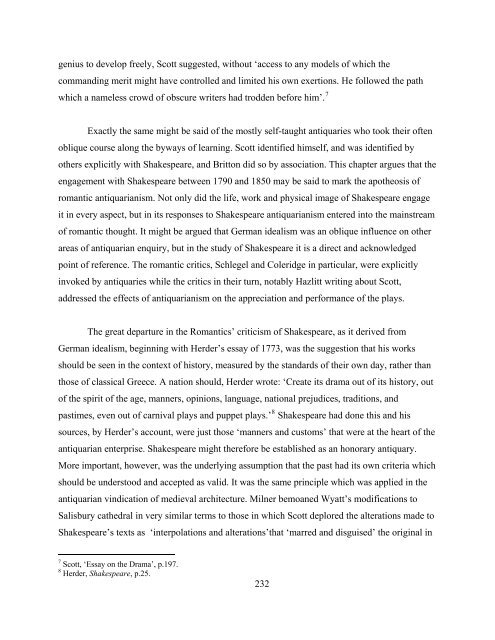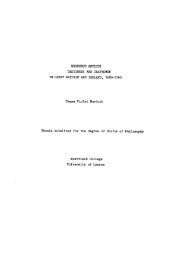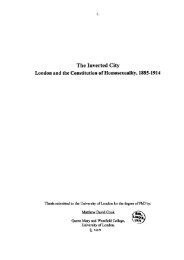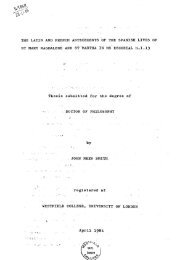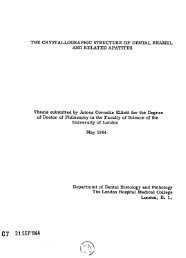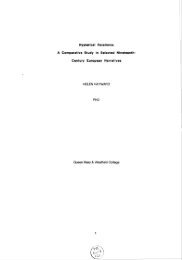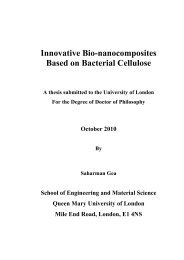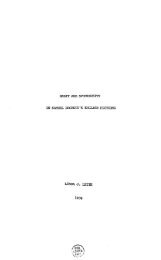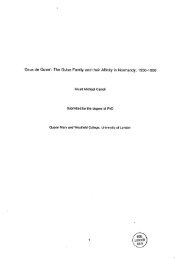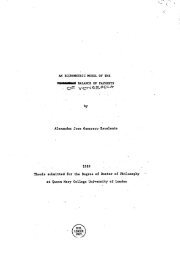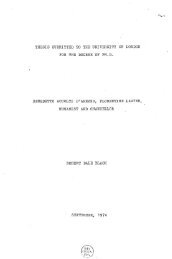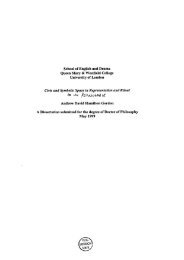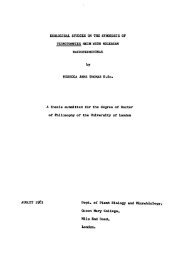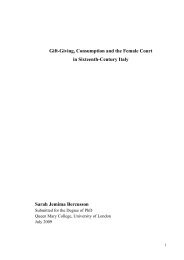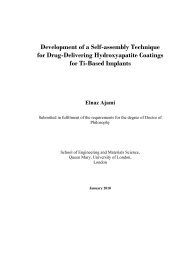Antiquaries in the Age of Romanticism: 1789-1851 - Queen Mary ...
Antiquaries in the Age of Romanticism: 1789-1851 - Queen Mary ...
Antiquaries in the Age of Romanticism: 1789-1851 - Queen Mary ...
Create successful ePaper yourself
Turn your PDF publications into a flip-book with our unique Google optimized e-Paper software.
genius to develop freely, Scott suggested, without ‘access to any models <strong>of</strong> which <strong>the</strong><br />
command<strong>in</strong>g merit might have controlled and limited his own exertions. He followed <strong>the</strong> path<br />
which a nameless crowd <strong>of</strong> obscure writers had trodden before him’. 7<br />
Exactly <strong>the</strong> same might be said <strong>of</strong> <strong>the</strong> mostly self-taught antiquaries who took <strong>the</strong>ir <strong>of</strong>ten<br />
oblique course along <strong>the</strong> byways <strong>of</strong> learn<strong>in</strong>g. Scott identified himself, and was identified by<br />
o<strong>the</strong>rs explicitly with Shakespeare, and Britton did so by association. This chapter argues that <strong>the</strong><br />
engagement with Shakespeare between 1790 and 1850 may be said to mark <strong>the</strong> apo<strong>the</strong>osis <strong>of</strong><br />
romantic antiquarianism. Not only did <strong>the</strong> life, work and physical image <strong>of</strong> Shakespeare engage<br />
it <strong>in</strong> every aspect, but <strong>in</strong> its responses to Shakespeare antiquarianism entered <strong>in</strong>to <strong>the</strong> ma<strong>in</strong>stream<br />
<strong>of</strong> romantic thought. It might be argued that German idealism was an oblique <strong>in</strong>fluence on o<strong>the</strong>r<br />
areas <strong>of</strong> antiquarian enquiry, but <strong>in</strong> <strong>the</strong> study <strong>of</strong> Shakespeare it is a direct and acknowledged<br />
po<strong>in</strong>t <strong>of</strong> reference. The romantic critics, Schlegel and Coleridge <strong>in</strong> particular, were explicitly<br />
<strong>in</strong>voked by antiquaries while <strong>the</strong> critics <strong>in</strong> <strong>the</strong>ir turn, notably Hazlitt writ<strong>in</strong>g about Scott,<br />
addressed <strong>the</strong> effects <strong>of</strong> antiquarianism on <strong>the</strong> appreciation and performance <strong>of</strong> <strong>the</strong> plays.<br />
The great departure <strong>in</strong> <strong>the</strong> Romantics’ criticism <strong>of</strong> Shakespeare, as it derived from<br />
German idealism, beg<strong>in</strong>n<strong>in</strong>g with Herder’s essay <strong>of</strong> 1773, was <strong>the</strong> suggestion that his works<br />
should be seen <strong>in</strong> <strong>the</strong> context <strong>of</strong> history, measured by <strong>the</strong> standards <strong>of</strong> <strong>the</strong>ir own day, ra<strong>the</strong>r than<br />
those <strong>of</strong> classical Greece. A nation should, Herder wrote: ‘Create its drama out <strong>of</strong> its history, out<br />
<strong>of</strong> <strong>the</strong> spirit <strong>of</strong> <strong>the</strong> age, manners, op<strong>in</strong>ions, language, national prejudices, traditions, and<br />
pastimes, even out <strong>of</strong> carnival plays and puppet plays.’ 8 Shakespeare had done this and his<br />
sources, by Herder’s account, were just those ‘manners and customs’ that were at <strong>the</strong> heart <strong>of</strong> <strong>the</strong><br />
antiquarian enterprise. Shakespeare might <strong>the</strong>refore be established as an honorary antiquary.<br />
More important, however, was <strong>the</strong> underly<strong>in</strong>g assumption that <strong>the</strong> past had its own criteria which<br />
should be understood and accepted as valid. It was <strong>the</strong> same pr<strong>in</strong>ciple which was applied <strong>in</strong> <strong>the</strong><br />
antiquarian v<strong>in</strong>dication <strong>of</strong> medieval architecture. Milner bemoaned Wyatt’s modifications to<br />
Salisbury ca<strong>the</strong>dral <strong>in</strong> very similar terms to those <strong>in</strong> which Scott deplored <strong>the</strong> alterations made to<br />
Shakespeare’s texts as ‘<strong>in</strong>terpolations and alterations’that ‘marred and disguised’ <strong>the</strong> orig<strong>in</strong>al <strong>in</strong><br />
7 Scott, ‘Essay on <strong>the</strong> Drama’, p.197.<br />
8 Herder, Shakespeare, p.25.<br />
232


